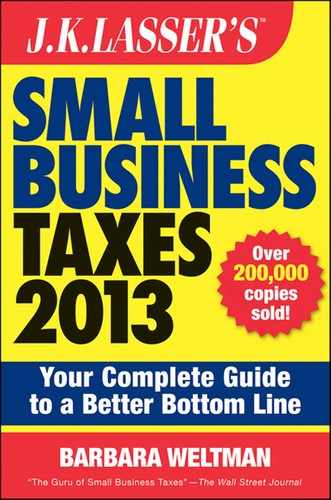Involuntary Conversions
If business property is destroyed or stolen, condemned or disposed of through threat of condemnation and you receive insurance proceeds or other funds to compensate you for your loss, you have suffered an involuntary conversion. Condemnations are the taking of your property for public purposes, such as building roads or putting up utility poles—in effect a forced sale. Threat of condemnation occurs when you learn from a government official or other authorized person that the government intends to take your property. If you do not sell it to the government, it will be condemned.
If the funds you receive for the involuntary conversion of your property exceed your adjusted basis in the involuntarily converted property, you have a gain that is currently taxable unless you qualify to postpone your gain (explained later). If the funds you receive are less than your adjusted basis in the involuntarily converted property, you have a loss that is currently deductible (subject to usual loss limitation rules discussed in this chapter and in Chapter 5).
In reporting condemnation awards, you can reduce your receipts by any legal fees or other expenses you incurred to obtain the payment as well as any special assessments levied against the part of the property if only a portion of the property was condemned. If amounts are withheld from the award to pay off your mortgage or outstanding taxes, you treat these amounts as payment you receive. Also add to the amount any severance payments you receive for the decrease in the value of the property you retain if only a portion of the property was condemned. The portion of gain relating to severance damages can be postponed in the same way as direct payments for the condemned property.
In figuring your gain or loss from an involuntary conversion, certain payments related to the event are not taken into account (they are treated separately):
- Relocation payments from the federal government or an assistance program. If you are displaced from your business (including a home in which you maintain a home office) or farm, you may be eligible for these funds. These amounts are tax-free payments.
- Interest on a condemnation award. The municipality may pay you out over time, plus interest. This interest is reported separately as interest income (see Chapter 4).
Election to Postpone Gain
You make the election to postpone gain by acquiring replacement property within set time limits. In deciding whether or not to postpone gain, keep in mind that you do not have to use the insurance proceeds or other funds to acquire the replacement property—you need only invest a similar amount. You can, for example, spend the proceeds and take a loan to buy the replacement property. First, consider the advantage and disadvantage to help you decide whether or not you want to postpone gain.
- Advantage—Postponing gain allows you to use the proceeds undiminished by taxes on your gain.
- Disadvantage—You must reduce the basis of the replacement property by the amount of gain not immediately recognized. This results in a lower basis for purposes of figuring depreciation on the replacement property as well as for determining gain or loss on the disposition of the property.
REPLACEMENT PROPERTY
Replacement property is property that is similar or related in service or use to the involuntarily converted property. Similar or related means that the functions of the old and replacement properties are related. For example, if 1 piece of machinery is destroyed in a storm and you buy a new machine to perform the same work in your business, the new machine is clearly replacement property.
You need not buy the property directly. You are treated as acquiring replacement property if you buy at least an 80% interest in a corporation that owns property similar or related in service or use to the involuntarily converted property. However, you cannot buy replacement property from a related party—a business you control or a close relative—if the gain is more than $100,000. You can buy replacement property from a related party if the gain is $100,000 or less.
If your business property is destroyed in a disaster within an area qualifying for federal disaster relief, acquiring any tangible property for your business is treated as similar or related even if the functions of the old and new property are entirely different.
REPLACEMENT TIME LIMITS
You must decide whether or not to postpone gain by acting with set time limits to place replacement property in service for your business. Generally, you have until the end of the 2 years following the close of the year in which gain from the involuntary conversion was realized to acquire replacement property. For property involuntarily converted on or after August 25, 2005, as a result of Hurricane Katrina, Rita, or Wilma (and the 2008 Midwest floods and Hurricane Ike), the 2-year replacement period was extended to 5 years.
If business property has been condemned (or sold under threat of condemnation), the replacement period is 3 years from the close of the year in which the gain from condemnation (or threat of condemnation) was realized. However, if you buy replacement property by acquiring a controlling interest in a corporation, then the 2-year replacement period applies.
If you decide you want to postpone gain but time is running out on buying replacement property, you can request an extension. For example, if you have already found property but have yet to close on the sale, ask for more time to do so. Address your request to the local district director of the IRS. Do not let the replacement period expire without submitting your extension request—it may be almost impossible to obtain an extension at this late date.
